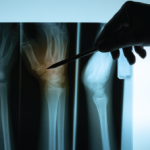However, she emphasizes that older patients need to understand the importance of maintaining bone health, because of the cascading adverse events that occur once a fracture occurs.
What Can Rheumatologists Do to Improve Osteoporosis Screening?
Educating patients about the need for maintaining bone strength into older age is one of the ways rheumatologists can help improve osteoporosis screening, according to Dr. Hansen, who is a coauthor on the updated 2017 ACR Guideline for the Prevention and Treatment of Glucocorticoid-Induced Osteoporosis.4 “We need to educate our patients that when you break a bone it will significantly influence not just your morbidity but your mortality,” she says. “We can protect the skeleton by prescribing osteoporosis medication.”
She emphasizes that rheumatologists need to advocate for their patients by ensuring bone density tests are properly reimbursed by insurance plans.
Dr. Gillespie also emphasizes the need for rheumatologists to discuss the importance of osteoporosis prevention, screening and management. “While common, osteoporosis and fragility fracture needn’t be an inevitable part of aging,” she says.
Mary Beth Nierengarten is a freelance medical journalist based in Minneapolis.
References
- U.S. Preventive Services Task Force. Screening for osteoporosis: U.S. Preventive Services Task Force recommendation statement. Ann Intern Med. 2011 Mar 1;154(5):356–364.
- Gillespie CW, Morin PE. Trends and disparities in osteoporosis screening among women in the United States, 2008–2014. Am J Med. 2017 Mar;130(3):306–316.
- Gillespie CW, Morin PE. Osteoporosis-related health services utilization following first hip fracture among a cohort of privately-insured women in the United States, 2008–2014: An observational study. J Bone Miner Res. 2017 May;32(5):1052–1061.
- Buckley L, Guyatt G, Fink HA, et al. 2017 American College of Rheumatology Guideline for the Prevention and Treatment of Glucocorticoid-Induced Osteoporosis. Arthritis Care Res (Hoboken). 2017 Aug;69(8):1095-1110.

